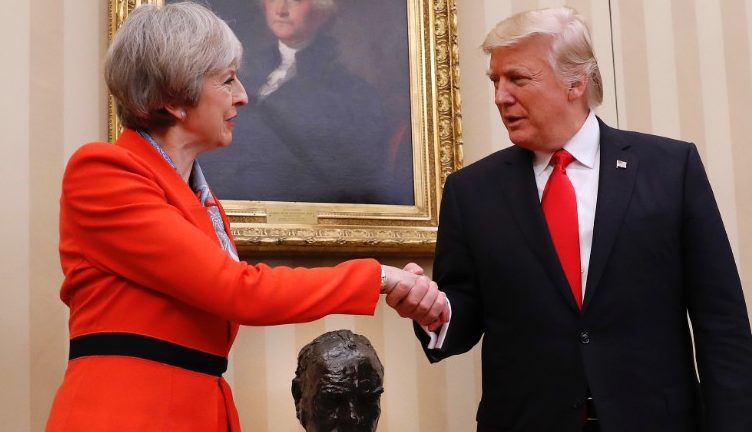It would be funny watching Theresa May and and the brokers of Brexit bowing before a U.S. President they clearly disdain, except that as an American I can hardly afford to laugh, not with the Constitution and nuclear codes in the breast pocket of a bigoted, unbalanced ignoramus.
The urge on both sides of the Atlantic to retreat to an earlier age, one before globalization, may be understandable but it’s also self-defeating. There’s no returning. The world is overrun with symbiotic relationships and to deny the Other is to starve yourself. The UK and U.S. will now both learn the hard way that in this age isolation is impossible and closed doors costly.
The Trans-Pacific Partnership trade deal brokered by President Obama was an imperfect one, as any pact among numerous nations would be, but it allowed the U.S. an abiding and significant soft power in the region of our fiercest competitor, China, which will now likely benefit from our withdrawal. The ban on refugees and immigrants from Muslim nations, probably illegal, is similarly shortsighted, sacrificing our greatest historical resource–diverse human capital–in a misguided attempt to prevent terrorism, a much smaller threat to Americans than guns or even cars.
Going forward, the United States and United Kingdom won’t be most challenged by connections to other countries but competition from them. Walls and exits will not preserve us.
From a smart Economist analysis written just prior to May’s D.C. visit:
So why is Mrs May hurrying to Washington? Because Brexit compels Britain’s leaders to show that the country has powerful allies. And “my Maggie” (as the president calls Mrs May) is desperate to line up a Britain-America trade deal that can be closed as soon as Brexit takes place, probably in 2019.
Whether this will end happily is uncertain. In trade negotiations, size matters. Larger economies can stipulate terms that suit them. Britain, an economy of 60m people, has much less leverage in trade talks than the EU, a market of 500m, or the United States, one of 300m. Mr Trump may promise an agreement “very quickly” and to show other countries that it is safe to leave the EU by giving Britain generous treatment. But more than anything else he is an America First deal-wrangler who knows he has the upper hand. A rushed agreement could see the National Health Service opened up to American firms and environmental and food standards diluted (think hormone-treated beef). Such concessions could upset British voters, who backed Brexit partly because Leavers said it would help the country’s health-care system. They would also frustrate a trade deal with the EU, a much more important export destination.
The curious thing is that Brexit was supposed to be about “taking back control”: immunising the country from foreign whim and interest, while asserting national dignity and independence. Increasingly that looks like a bad joke. The British elite feels it has no choice but to prostrate itself before an American president it clearly finds odious. To keep businesses from moving elsewhere, Britain may have to shadow EU regulations and pay into EU programmes without the chance to shape either. Its trade deals will be forged with a fraction of the negotiating force that has long promoted its interests. That means more concessions to the tariff and regulatory preferences of foreigners. Its application to become a full member of the World Trade Organisation is yet another opportunity for others to impose conditions and costs.•

